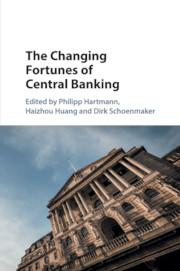Book contents
- The Changing Fortunes of Central Banking
- The Changing Fortunes of Central Banking
- Copyright page
- Contents
- Figures
- Tables
- Contributors
- Acknowledgement
- 1 Introduction and Overview
- Part I Monetary Economics and Policy
- Part II Financial Stability and Regulatory Policy
- Part III Foreign Exchanges and International Architecture
- Part IV The Millennium Challenges of Central Banks
- 19 Overburdened Central Banks
- 20 Central Banks, National Balance Sheets and Global Balance
- 21 Recognising the Economy as a Complex, Adaptive System
- 22 The Changing Fortunes of Central Banking
- Index
- References
19 - Overburdened Central Banks
Can Independence Survive?
from Part IV - The Millennium Challenges of Central Banks
Published online by Cambridge University Press: 29 March 2018
- The Changing Fortunes of Central Banking
- The Changing Fortunes of Central Banking
- Copyright page
- Contents
- Figures
- Tables
- Contributors
- Acknowledgement
- 1 Introduction and Overview
- Part I Monetary Economics and Policy
- Part II Financial Stability and Regulatory Policy
- Part III Foreign Exchanges and International Architecture
- Part IV The Millennium Challenges of Central Banks
- 19 Overburdened Central Banks
- 20 Central Banks, National Balance Sheets and Global Balance
- 21 Recognising the Economy as a Complex, Adaptive System
- 22 The Changing Fortunes of Central Banking
- Index
- References
Summary
- Type
- Chapter
- Information
- The Changing Fortunes of Central Banking , pp. 335 - 340Publisher: Cambridge University PressPrint publication year: 2018
References
- 1
- Cited by



